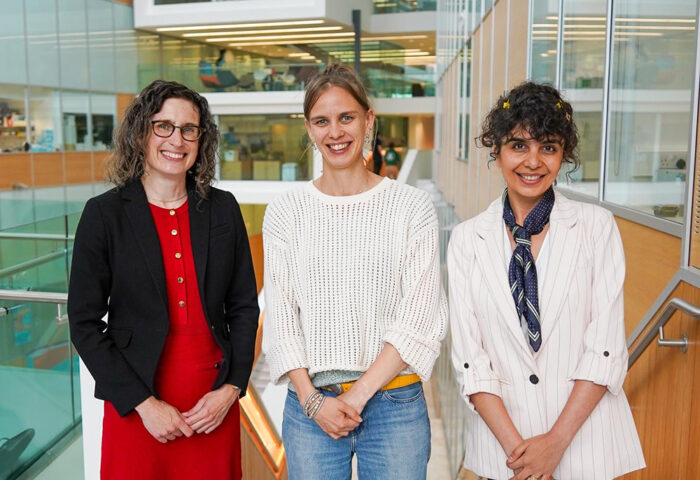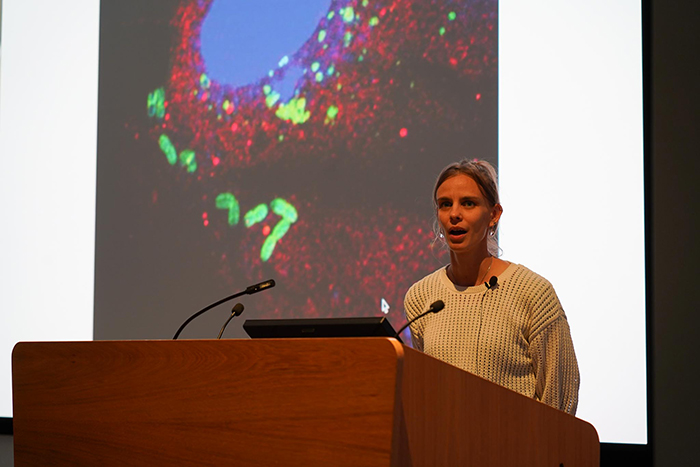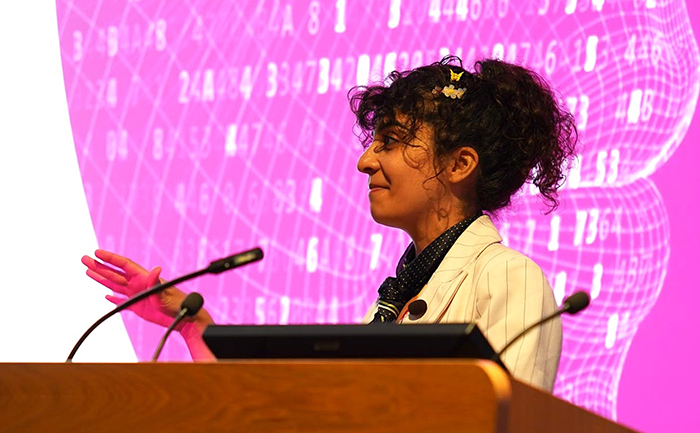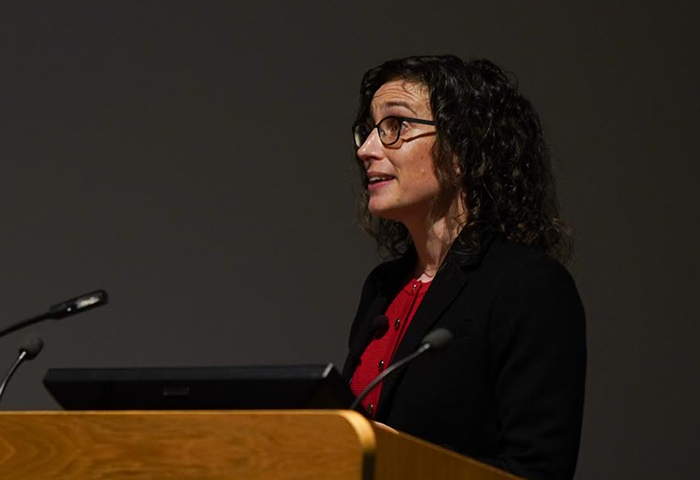
The LMB recently welcomed back three inspiring alumnae to discuss the diverse career paths they have embarked upon since leaving the LMB. The ‘What Next for Your Career’ event highlighted Teresa Thurston, Soudabeh Imanikia and Beth Thompson and marks the fifteenth year the LMB have collaborated with the Cambridge Association for Women in Science and Engineering (AWiSE) to help further their goal of ‘connecting and inspiring women in science, technology, engineering, mathematics and medicine.’

Teresa joined the LMB in 2006, undertaking a Ph.D in Felix Randow’s group in the LMB’s PNAC Division followed by a short postdoc position. In 2011, she moved to Imperial College London, where she went on to start her own research group after receiving a 5-year BBSRC David Phillips Fellowship in 2018. Her group uses a multidisciplinary approach to investigate host-pathogen interactions. Later this year, she is moving her group to the University of Oxford.
As well as discussing the highlights from her career, Teresa also touched on times she’s had to overcome failure. She covered the struggles she’s faced dealing with mum guilt, imposter syndrome and dyslexia throughout her academic career, and the mentors she’s turned to for advice in these situations. These included an older postdoc she shared a lab with, who showed her how to manage a research career with family life. Teresa perhaps took this to the extreme; “I had a baby on the 4th of February, and I officially started my independent research project on the 5th of February!”
Finally, Teresa finished with sharing three guiding principles she’s adopted over the years; “Learn your limits and learn to say no, understand your strengths and carry them with you, and celebrate the highs and make your own positive culture.”

Soudabeh moved to the UK from Iran to pursue a career in science, completing an M.Sc. and Ph.D. at Kings College London before joining the LMB as a Career Development Fellow in 2015. She touched on the difficulties she faced searching for job opportunities overseas owing to immigration and visa complications. During her time at the LMB, she re-evaluated her career goals, coming to the conclusion that remaining in academia was not for her. She consequently threw herself into lots of different opportunities, including volunteering as a STEM Ambassador and supervising and teaching at Girton College, University of Cambridge, to help narrow down her next move.
Now, Soudabeh is a Molecular Diagnostics Science Manager at AstraZeneca, where she works on precision medicine. Her work is very collaborative, and she typically starts her days working with colleagues in Asia, moving on to collaborate with Europe and North America as the day progresses. She also remains actively involved in public engagement opportunities to share her work and is still a member of Girton College, where she is now an Official Fellow and Tutor. She commented, “It is extremely rewarding to see my students go to Senate House and get their degree – despite all the tears I have to wipe through the years.”
She finished with a comment on perseverance, something she is well versed in after applying over 15 times to AstraZeneca; “There is never a late or a missed opportunity.”

The final speaker was Beth Thompson, who completed a Ph.D. in the LMB’s Cell Biology Division with Andrew Travers. Beth left the LMB to become a Policy Trainee at the Royal Society of Chemistry, before joining the Wellcome Trust in 2009 where she is now Chief Strategy Officer overseeing a team of around 50. Her work on science policy has given her the opportunity to get involved in major issues such as pandemic preparedness, GDPR and its implications for health research, and securing the best Brexit deal for UK science. She serves as the bridge between researchers and policy makers and has had to learn to approach topics impartially, letting her own political leanings take a back seat to engage with both sides of the debate.
Discussing her career switch from lab to lobbying, she commented that the resilience she learnt from failed experiments prepared her well for the world of policy where, “you never get anyone to listen to you first time.” At the extreme, this perseverance has seen her chasing an MP down a corridor in the Houses of Parliament. She concluded with noting that her own scientific expertise actually proved less useful and that the transferrable skills she learnt during her Ph.D. are what have guided her career. Her advice to the audience was, “Don’t make too many assumptions about yourself. You do have a blank page – use it.”
After a Q&A session with the speakers, there was a networking opportunity where attendees met with the speakers and each other to discover more about the career paths that can follow a Ph.D. in the life sciences.
Cambridge AWiSE is a regional network for women in science, technology, engineering, maths and medicine (STEMM) in both industry and academia, and also for women who wish to return to a STEMM career after a break. The organisation’s objective is to bring together women with common interests to act as a source of support, information, and inspiration. Cambridge AWiSE aims to help women stay in STEMM to make the most of their careers, and provides regular talks, workshops, networking opportunities, and information.
Further references
Cambridge AWiSE
14th LMB-Cambridge AWiSE Event 2023